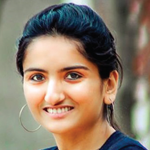Outstanding Students in Rheumatology
 The ARHP recognized two outstanding students in 2018: Danielle Rice, MSc, a PhD candidate at McGill University, Montreal, and Hiral Master, PT, MPTh, MPH, CPH, a PhD candidate at the University of Delaware, Newark.
The ARHP recognized two outstanding students in 2018: Danielle Rice, MSc, a PhD candidate at McGill University, Montreal, and Hiral Master, PT, MPTh, MPH, CPH, a PhD candidate at the University of Delaware, Newark.
“This award signifies that there’s an important role for rare diseases in the research world that will hopefully carry over to the clinical care patients receive,” says Ms. Rice. “This type of recognition provides additional motivation for me, the entire interdisciplinary team and the caregiver advisory committee for the growing impact of our work.”
As a recipient of a Vanier Canada Graduate Scholarship, which targets world-class doctoral students to study at Canadian universities, Ms. Rice provides psychotherapy in private clinics and tertiary hospitals in Montreal. As part of her doctoral dissertation, her research focuses on helping develop patient-centered interventions for individuals with scleroderma and their caregivers.
“Because of the rarity of the disorder, it’s something that doesn’t get a lot of attention or funding,” Ms. Rice says, referring to scleroderma as a burdensome disease. “Treatment options are directed toward the patient—as they should be—but then the family member is left out despite the fact that they’re very involved in the process. Caregivers go through turmoil from the time of diagnosis.”
While at McGill, Ms. Rice earned her Master of Science degree in 2015 and is on track to complete her PhD in clinical psychology in 2020.
Currently, she is developing interventions that involve caregivers throughout the entire treatment process, including those that can be implemented shortly after a diagnosis is made. She believes caregivers are an essential ingredient to patient care and must be involved upfront and during doctor appointments.
Her dream job would involve research and clinical and policy work. She says they all go hand in hand and can make impactful changes in understanding and treating scleroderma.
Meanwhile, she has volunteered for the ARHP Research Subcommittee. During her two-year term, she hopes to create additional learning opportunities, lead research sessions and plan online seminars that attract researchers and clinicians.
She says her research has taught her something valuable about herself: mainly, that she needed to expand her perspective by focusing not only on patients and their disease, but also on their caregivers.
She believes the ARHP will continue to be helpful to her ongoing learning. “I saw many learning opportunities [at the Annual Meeting] for every stage of my career that allow for ongoing engagement with international and national experts in various fields of rheumatology,” Ms. Rice says. “I look forward to many more years being a part of ARHP.”
 “Getting an award from an organization that I admire and follow means a lot to me,” says Ms. Master. “It affirms that my colleagues and eminent leaders in the field of rheumatology appreciate my work, which motivates me toward completing my PhD at the University of Delaware and ultimately, become an independent clinical scientist in rheumatology.”
“Getting an award from an organization that I admire and follow means a lot to me,” says Ms. Master. “It affirms that my colleagues and eminent leaders in the field of rheumatology appreciate my work, which motivates me toward completing my PhD at the University of Delaware and ultimately, become an independent clinical scientist in rheumatology.”
After obtaining her bachelor’s degree in 2011 from Seth G.S. Medical College in Mumbai, India, Ms. Master studied at Rajiv Gandhi University of Health Sciences, Mangalore, India, and earned a master’s degree in physical therapy in 2013. She continued her education in the U.S. at the University of North Texas Health Science Center, Fort Worth, where she received a Master of Public Health (biostatistics) in 2015. Her research focused on investigating physical functioning and health outcomes measures in adults with knee osteoarthritis.
This year, she received the University Doctoral Fellowship Award, which was sponsored by Unidel Foundation. Her interest in rheumatology, along with support from her school mentor—Daniel K. White, PT, ScD, MSc, assistant professor, Department of Physical Therapy—prompted her to join the ARHP as a student member and then volunteer in 2017 for the organization’s Annual Meeting Planning Committee. She has presented her research at national and international conferences.
“As a licensed physical therapist and a PhD student, I attended [the ACR/ARHP Annual Meeting] in 2016, not knowing anyone and not sure what to expect,” recalls Ms. Master. “I still went and met so many people with similar research interests and goals. I presented my research and got feedback from researchers whom I’ve always admired. I got so many things from the conference, much more than expected.”
Her long-term goal is to become an independent clinician-scientist in rheumatology with expertise in public health and physical therapy. Meanwhile, she reviews two peer-reviewed scientific journals and has a keen interest in mentoring emerging scientists, especially women scientists from developing countries who lack the academic and financial resources to evolve into the next generation of investigators. Currently, she is actively involved in organizing several university-level social and educational events.
As a millennial, she plans on integrating her love of technology with her research efforts to make research “more fun.”
“I’m really interested in using technology as digital detectors to investigate and identify underlying mechanisms of diseases, like osteoarthritis,” Ms. Master says.



